Every organization operates with Human Resources. Many companies have a Human Resources department, with one or more HR associates. Others prefer to hire a freelance HR Consultant to fill the role temporarily. Regardless of the number of HR associates, many organizations hire a freelance HR Consultant to help with certain HR needs. This means there are many opportunities to start a business offering HR services. In this post, we’ll evaluate how to become a freelance HR Consultant to help you get started.
What is a Freelance HR Consultant?
A freelance HR Consultant provides human resource services for companies and organizations that don’t need to hire a full-time HR associate or have a special need for outside help.
HR Consultants often work independently, so they need to be self-motivated. HR consulting covers a lot of tasks and roles, so it’s possible to choose specific areas of HR that fit your skill set. Responsibilities vary from one client to another.
Freelance HR Consultants perform tasks such as:
- Auditing HR policies
- Developing employee guidelines
- Assisting with HR policy changes
- Implementing new HR policies
- Assisting with hiring employees
- Evaluating job/skill fit
- Analyzing salary scales
- Evaluating employee performance
- Assisting with dismissing employees
- Organizing HR data
- Assisting with writing and editing the employee handbook
- Assisting with employee training
- Understanding the company’s career paths
- Providing employee guidance
- Advising the employer with HR concerns as needed
- Overseeing HR for company growth
- Overseeing HR for company downsizing
The freelance HR Consultant will also need to understand the company’s environment, culture, and needs. Hiring a freelance HR Consultant is an advantage for small companies that need these tasks temporarily. These are often short-term projects that don’t require a full-time HR department.
Small companies want to ensure they work within the laws and guidelines, but they don’t have that expertise themselves. Hiring a freelance HR Consultant gives them this assurance.
New businesses often need help establishing their policies and procedures to ensure they meet the legal requirements. Established companies may need help updating their policies.
Another advantage is the freelance HR Consultant is not influenced by company politics, friends within the company, etc. Hiring a freelancer removes these biases and issues. This promotes and ensures fair treatment.
How to Become a Freelance HR Consultant
To become a freelance HR Consultant, you’ll need both business skills and HR skills. Here’s a closer look at the skills you need and how to get started as a freelance HR Consultant.
Education in Human Resources
Becoming a freelance HR Consultant does not require a formal education or certification, but it does help. If you have a degree or a certificate, you have an advantage over those who do not have them. There are lots of skills required, and getting a degree or a certificate is one of the best ways to obtain those skills.
Skills needed include:
- Written and oral communication
- Leadership
- Critical thinking
- Decision making
- Problem-solving
- Relationship building
- Business knowledge
- Planning
- Self-control
- Mindfulness
- Office procedures
Many full-time HR associates obtain a master’s degree in HR. Some obtain a Master of Business Administration (MBA) with a focus in Human Resources.
Here’s a look at a few courses and certifications to help you get started.
SHRM
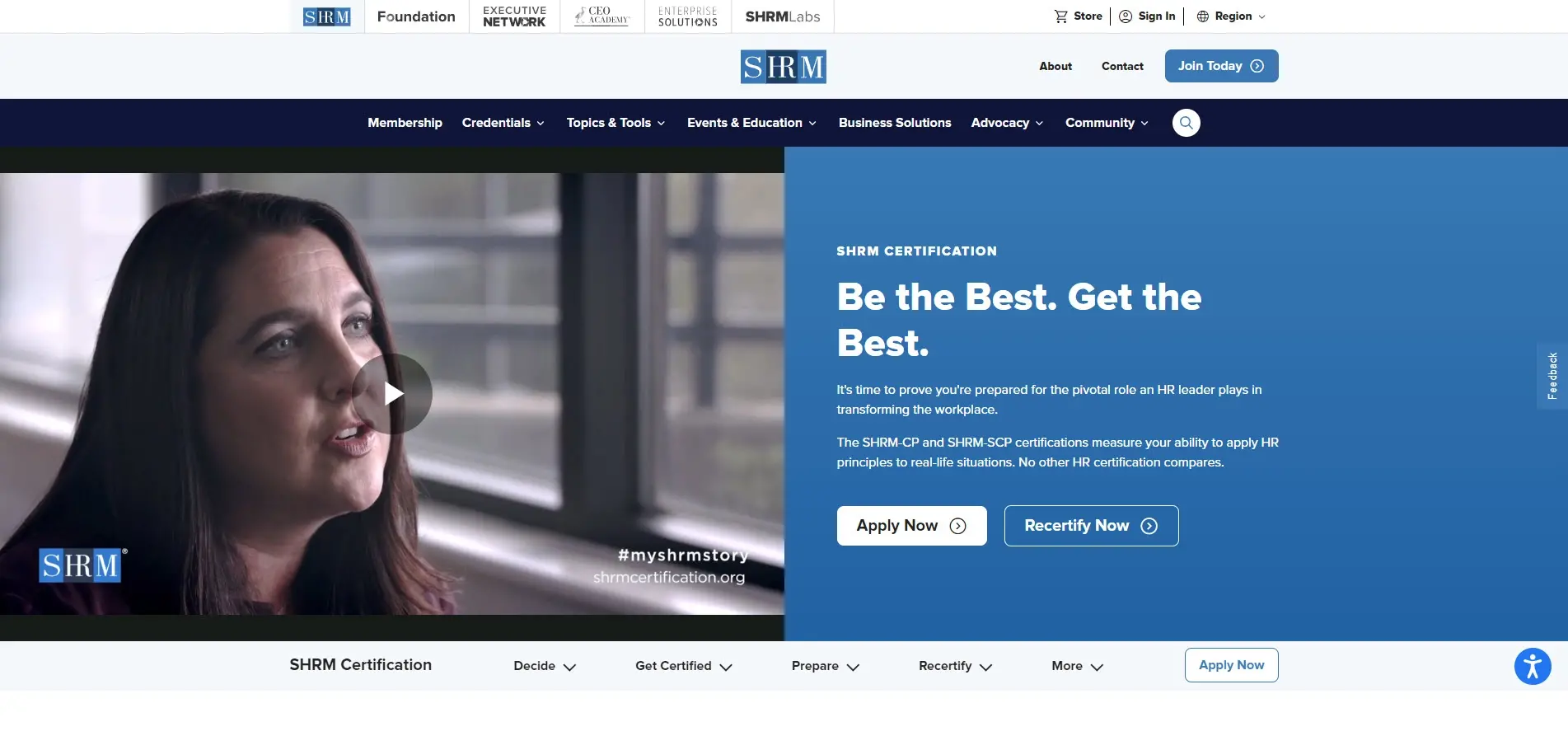
SHRM certification is completely online and takes between 3-4 months to complete. They have two certifications to choose from: the standard certification and an advanced certification.
AAIM
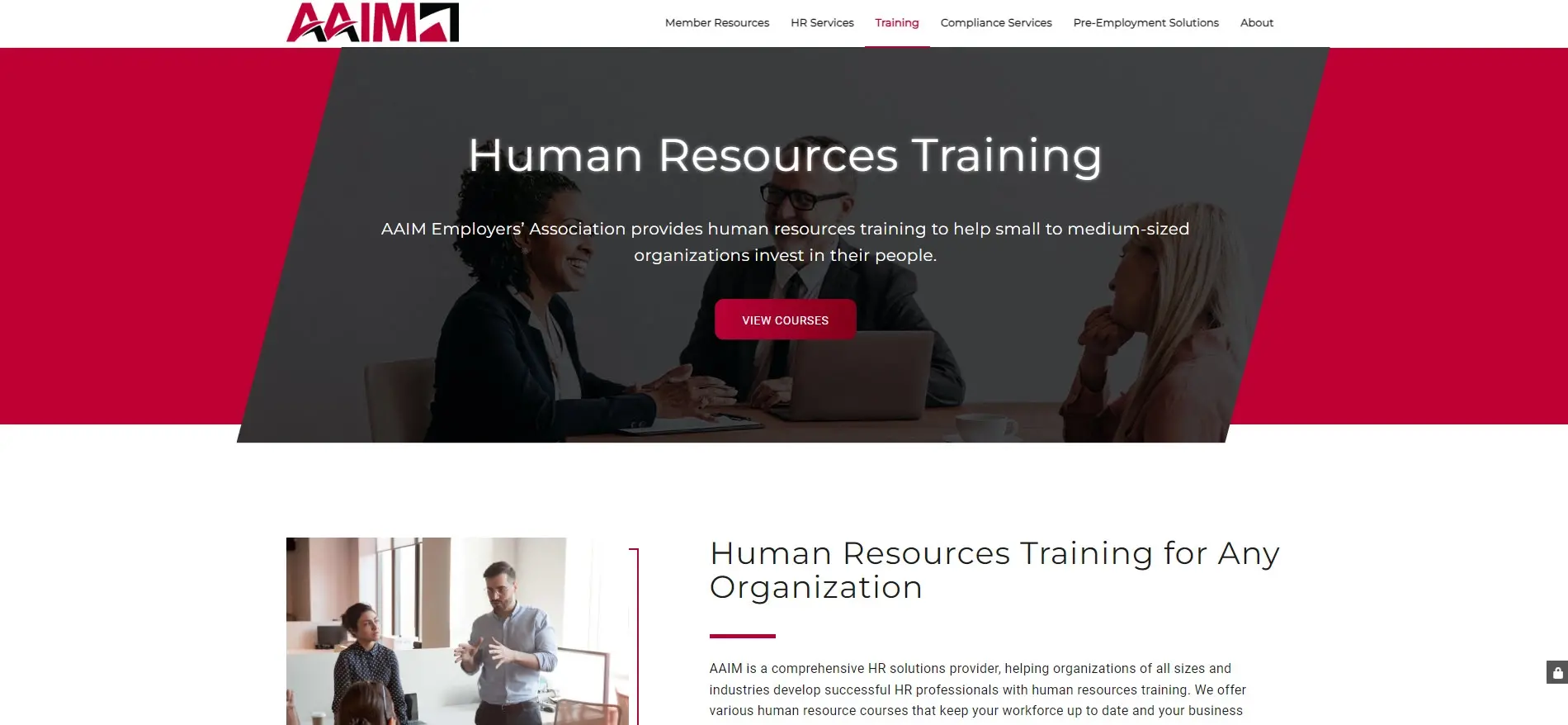
AAIM offers several training courses in Human Resources. They include lots of courses that cover topics such as regulatory and compliance, employment laws, organizational strategy, employee engagement, and lots more.
HRMI
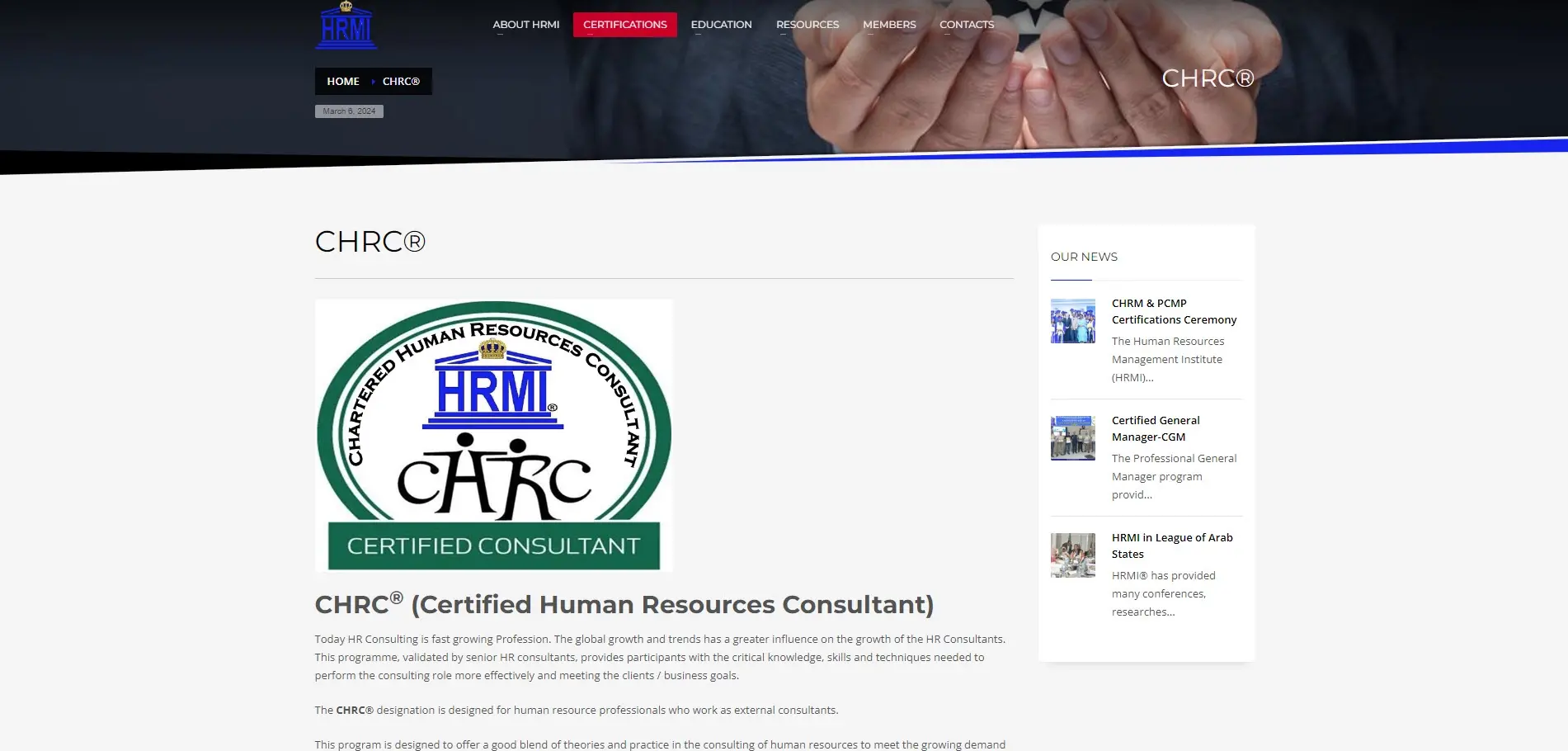
HRMI includes several Human Resources certifications. Certifications include topics such as professional, manager, director, consultant, trainer, and lots more. Unfortunately, this is not a good option to get started unless you already have a bachelor's degree and 10 years of experience in Human Resources with 4 years at the management level. If you do have this education and experience, this certification can take you to the next level and would be helpful for anyone wanting to become a freelance HR Consultant.
Education in Business
While you don’t need a degree or certification in business, you will need to learn how to start and manage your business. This includes managing the finances, marketing, planning, the legal side of business, and lots more.
There are lots of free and paid business courses online. Depending on where you live, there may be business courses that you can take locally. There are many books on starting and running a freelance business. I recommend at least getting a good book on freelancing and going from there. You should plan to keep learning about business.
Legal Requirements
Depending on your location in the world, you might need a business license to operate your freelance business. You’ll also need to decide the type of business entity you want to build. Choose between sole proprietorship, limited liability company (LLC), etc. You’ll need to research the legal requirements in your location and where you want to do business.
For the US, the Small Business Administration provides all the information needed to legally start and operate a small business. They also have information that can help you get started regardless of your location.
Choose a Niche
It’s difficult to work as a generalist with any freelance business. Working as an HR Consultant is no different. It’s best to focus on the types of clients you’d like to work with. For example, you might choose to work with manufacturing companies, non-profit organizations, tech companies, etc.
By specializing, you can charge more for your services. However, don’t tighten your niche too much. It could be difficult to find work if there aren’t many businesses in your niche.
Getting Experience in HR Consulting
The more experience you have working with Human Resources the better. Getting the experience needed to build your portfolio is almost always a difficult part of getting started. You need the portfolio to get the work, and you need the work to build your portfolio.
One way to get the experience you need is to work with people or organizations you already know. Another option is to work with an HR agency as an entry-level HR associate or an intern. Volunteering to help with HR for a non-profit organization would also benefit when getting started. I don’t recommend volunteering for the long term unless you have the extra time on your hands.
All of these options can help you get started in HR. They help build foundational skills and experience that can build your portfolio and help you get clients.
Set Your Prices
First, you must consider your skills and experience. Most likely, you’ll have to start with lower prices until you gain the experience and clientele. Once you’ve gained enough experience, you can raise your prices accordingly. Keep in mind that low doesn’t mean cheap. Search for the wage range of entry-level HR associates in your area to get an idea of where to start.
Rather than charging by the service, most HR Consultants charge an hourly rate. This would include all tasks done within the time frame. Charging by the project is difficult for this type of work because there can always be extra work involved that isn’t foreseeable. Be sure to include any expenses, such as travel, in your rate.
Set your price based on your annual income goals. Be sure to include any benefits you want to purchase for yourself, the cost of doing business, etc. You’ll need to charge a higher rate than what the companies would pay normally. Most companies are willing to pay higher rates considering they only pay for the hours they need. This still saves them a lot of money throughout the year.
Keep your prices consistent, and don’t allow clients to talk you down on your prices. Those same clients don’t allow their customers to talk them down either. Know your value and stick to your prices. If the client doesn’t understand your prices and value, they won’t value your services.
Build Your Online Presence
Create a professional website to showcase your portfolio, qualifications, skills, and services. Your website should include the best methods to contact you and links to your work-related social media profiles. For more information about building a website for your freelance HR consulting business, see the articles The Small Business Checklist: Four Things to Consider Before You Build a Website, How to Start Your Own Business Website, and Top 10 Online Courses for WordPress to Build a Website.
Create social media profiles for your freelance HR consulting business. Go where your clients are. Focus on LinkedIn and other platforms where your ideal clients are present. Create profiles on websites that specialize in HR. Join HR online associations. Remember, you are your product and the face of your brand. Building your brand also builds your credibility.
For more information about building your social media presence, see the article Social Media Marketing in the 2020s.
Build Your Network
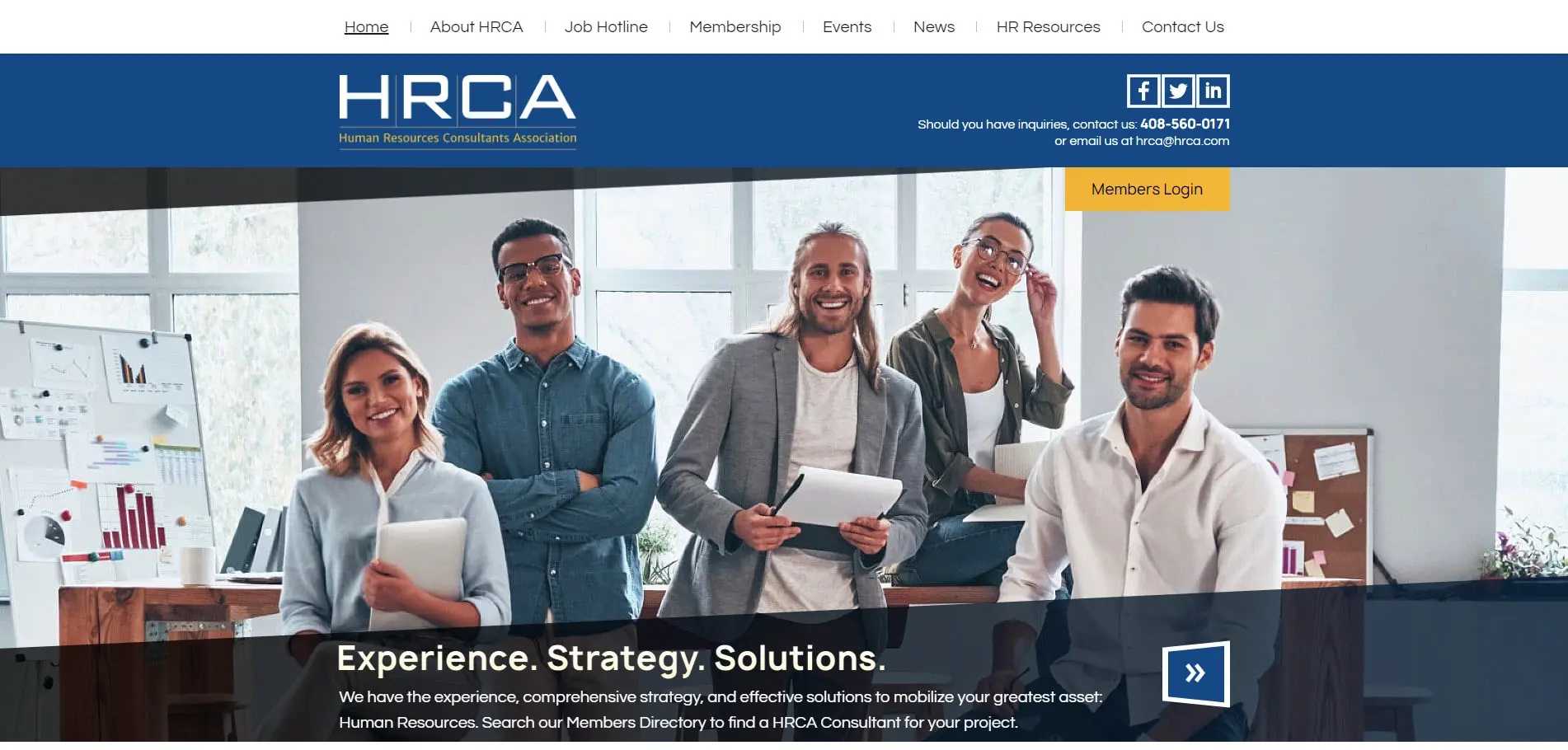
This image is from https://www.hrca.com/
You’ll need to build a large network to start and grow your business. Begin with your previous employers and clients. Also, consider your friends and family. Anyone on your list may need your services, or they may know someone who might.
Build your network through sites such as LinkedIn. Attend conferences and join HR associations like the one in the image above. Also, attend job fairs and other business events in your local area.
The larger your network the better. Utilize all of these options to grow your network of potential clients.
For more information about building your online network, see the article Online Business Networking.
Getting Work as a Freelance HR Consultant
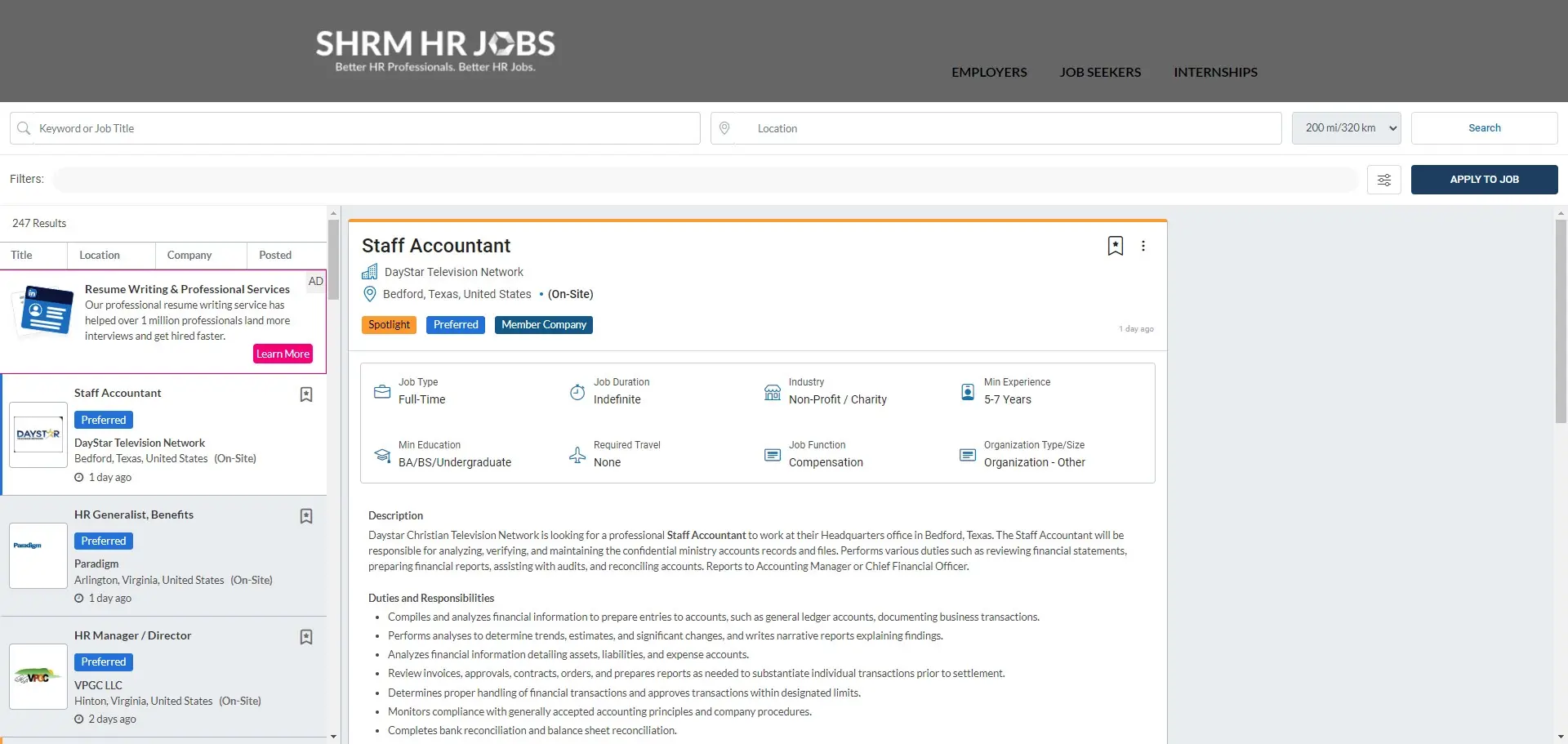
This image is from https://jobs.shrm.org/jobs/
Look within your network of family, friends, past employers, past clients, etc. Contact them to see if they need your services or if they know a company or organization that might be interested. Focus on marketing your services.
Determine the niche you want to serve. It’s possible to work in many niches as a freelance HR Consultant, but you will be better equipped if you understand the clients’ industry. You’ll be able to make better decisions in interviews, assessing employee skills, understanding requirements, etc. You can build credibility and authority within your niche, which makes you more desirable and more valuable.
Search the job postings in your area for contract work. Apply for contract positions with local temporary staffing organizations. Also, check with other HR agencies in your area. They could need temporary help. This is a good way to build your experience. You might also find work through any HR associations you belong to.
Try to get as many contracts as you can handle. A client might not need your services consistently. The more clients you have access to, the easier it will be to stay working. Ask clients for testimonials and referrals.
As a freelance HR Consultant, you’ll probably have to work onsite. There may also be occasions when you can consult through a Zoom call. You may also need to work certain hours to meet their needs for various shifts. It’s best to be flexible and be available in the manner your clients need you.
Ending Thoughts on How to Become a Freelance HR Consultant
That’s our look at how to become a freelance HR Consultant. Human Resources is important to every business. Even if an organization already has an HR department, they may need to contract an HR specialist to help with specific tasks. This post steps through the process of starting your own HR consulting business to help you break into this lucrative and stable field.
We want to hear from you. Have you used any of these methods to become a freelance HR Consultant? Let us know about your experience in the comments.
Frequently Asked Questions
Can I freelance while working a full-time job?
Yes, but ensure it does not conflict with your current job’s terms and conditions. Manage your time effectively to balance both commitments.
Can I collaborate with other freelancers on projects?
Yes, collaboration can enhance your capabilities. Partnering with freelancers with complementary skills allows you to take on more extensive projects and offer a broader range of services.
Is it necessary to have a contract for each freelance job?
Yes, a contract is advisable for each job to clearly outline the scope of work, payment terms, deadlines, and other expectations.
What are the benefits of freelancing compared to traditional employment?
Benefits include flexibility in work hours and location, the ability to choose projects and clients, the potential for a diverse range of work, and the possibility of higher earnings.

Randy A. Brown is a freelance writer from east TN specializing in WordPress and eCommerce. He's a longtime WordPress enthusiast and loves learning new things and sharing information with others. If he's not writing or reading, he's probably playing guitar.
View all posts by Randy A. Brown




















